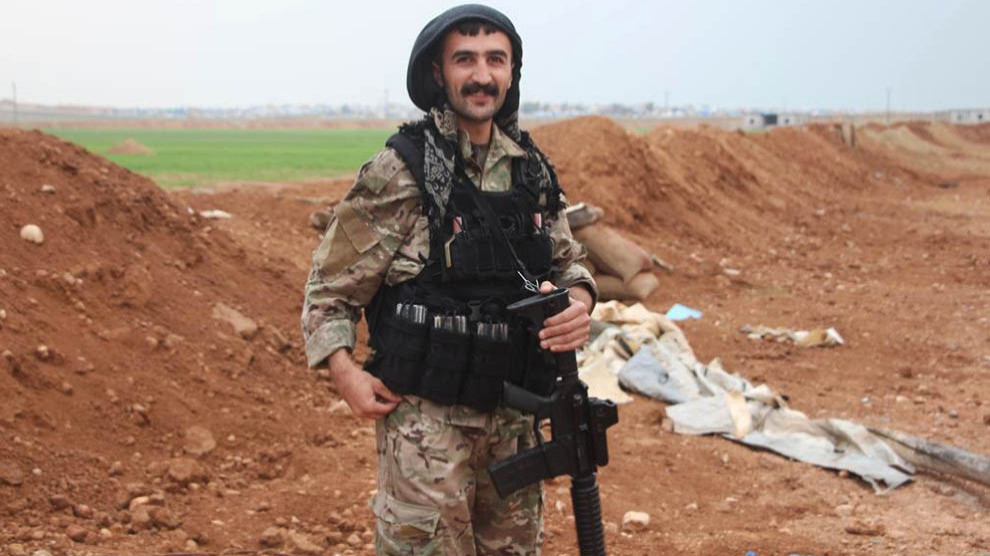Armenian Simko Harun is a great-grandson of survivors of the 1915 genocide and fighter of the Syrian Democratic Forces (SDF) in Ain Issa. Harun's ancestors went to Qamishlo more than a century ago, when more than 1.5 million Christian Armenians, Pontic Greeks and other Christians were murdered in massacres and on death marches into the Syrian desert in the then Ottoman Empire under the responsibility of the young Turks. But the Arabization policy of the Baath regime, which seized power in Syria in the 1960s, has left its mark. Even though Syria has a rich tradition of media and publications in the Armenian language, and Armenian daily newspapers, which no longer exist, had very large circulations for the small Armenian population at the beginning of the 20th century, today there is a "lost generation" that has lost its mother tongue. Armenians can look back on a long history in Syria, were largely equal under Hafiz al-Assad and have always enjoyed a "reputation of honesty and reliability", which was probably also due to their strong economic position. However, the preservation and transmission of their cultural achievements and traditions proved difficult in the years before the Rojava revolution. Most recently, under the rule of Bashar al-Assad, Armenian education was first scaled back and later completely banned from the plans of schools. After that, it was even forbidden in many places to mark the anniversary of the genocide. This was at a time when al-Assad was striving for better relations with Turkey.
Among the lost generation of Syrian Armenians is Simko Harun. Although he speaks fluent Kurdish, Arabic, Turkish and even German, he does not speak Armenian. Harun believes that his parents abandoned their language for fear of the regime. Against this background, he says, he has finally begun a search for his roots. In 2013 Simko Harun read the writings of the Kurdish leader Abdullah Öcalan and then he joined the popular defense units YPG with the aim of demanding accountability for the Armenian genocide and fighting against a new genocide. "I want to fight until Turkey admits its crime," he says.
Joint fight against assimilation
"The Syrian state is no different from the Ottoman Empire, which was a multi-ethnic state. Thousands of Armenians live here in Syria, and not only since the genocide. But because of the Arabization policy most of them do not speak their mother tongue. The intention behind this is the complete eradication of the Armenian existence. For fear of the Baath regime, Armenian was not spoken in my family. Many more Armenians lost their mother tongue due to the restrictions imposed on Armenian to assimilate its speakers to the national language. My personal struggle against this is to learn four Armenian words a day. My personal struggle is to counteract assimilation. I also do a lot of research on Armenian history."
Resistance is mandatory for descendants of genocide survivors
Harun Simko fights on the front line in Ain Issa, a small town in the canton of Girê Spî (Tal Abyad), against the Turkish Jihadist invasion of northern and eastern Syria. He and his companions are only two kilometres away from the positions of the Turkish army and its Islamist allies.
"Especially in the context of the massacres of the Armenians, it is of existential importance for us as descendants of genocide survivors to take part in this war against Turkey. To fight at the very front in the Ain Issa frontline is a duty for me," Harun explains.
The fighter notes that many of the jihadist proxies of NATO partner Turkey and its so-called SNA ("Syrian National Army") were recruited from former members of the "Islamic State" (ISIS) and committed war crimes and crimes against humanity against Yazidis, Syriacs, Armenians and Kurds between 2014 and 2015. The exact number of Armenians killed by the terrorist organization ISIS in Syria is still unclear.
"Turkey sees itself in the historical tradition of the Ottoman Empire and wants a new edition of the Caliphate. It is about the completion of all unfinished genocides' and the extermination of everything that does not fit into the strategically planned neo-Ottoman imperial policy. In order to achieve these goals, the Turkish state is using jihadists who have already committed massacres against our peoples. And it is these jihadists that we are fighting against here. Because only we can defend our homeland against these gangs. The history of massacres and genocides, our past, will not be repeated. We, who resist here for our peoples, will write the history of the future."














